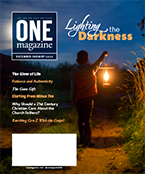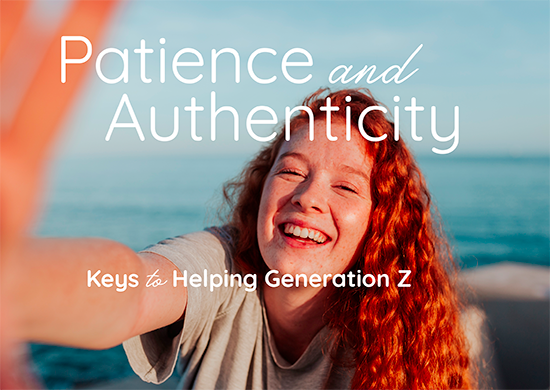
December - January 2023
Lighting the Darkness
------------------
|





Patience and Authenticity: Keys to Helping Generation Z
By Sarah J. Bracey
When I first began volunteering as a youth worker two decades ago,
my ministry was primarily with Millennials. Looking back, it is hard to believe
the things we worried about—high schoolers having iPods in the sanctuary or middle school girls wearing low-rise jeans. Millennials did have their share of troubling paths to navigate, but I was always able to relate to them and help them walk down those hard roads.
About four years ago, I noticed slight differences in the way I was relating to youth culture. At the time, I took it to mean I was no longer the “older sister” but had become a parental figure. As a teacher, I noticed certain lesson plans and activities did not apply as they had years before. As a counselor, my clients were different, too. What was happening? Was I losing touch? Perhaps.
Additionally, though, my students and clients were changing. I was seeing the shift from Millennials to Generation Z, those born somewhere around 1997–2012.
First, let’s make an agreement, an understanding so to speak, to avoid making this article a bashing session where we abuse the younger generation, saying, “Back in my day….” That is not helpful. Instead, I would like to have this frame of mind: What can I learn about this group of young people? How can I best minister to someone from this generation?
Turning of Age
Undoubtedly, not all those in Gen Z have the same characteristics. Generational psychology, also known as birth cohort effect, has its critics. To what extent do cultural events shape our individual characters? Whether or not you believe we are simply responding to cultural stimuli in our environments, the fashion, music, cultural values, and global events of formative years tend to form some traits we share with our peers. Isolating the real effects of a particular birth cohort event is very challenging, methodologically speaking. Also, I have no doubt that, through the course of this article, some will think, “Yeah that doesn’t apply to my kid,” and that is okay. My purpose is to examine the overall or general characteristics of Gen Z.
If you consider Baby Boomers, Gen X, and Millennials, each generation has its own quirks, often defined by major events like September 11th. While it is still very early to guess what events will stand out for Generation Z, one current reality is COVID. The pandemic was not only a national event but a global one, and its impact on Gen Z (and all living generations) has now surpassed many events of the past 50 years.
This generation will tell their children and grandchildren about the fear of the virus, the anxiety of knowing loved ones who had it, perhaps the grief of losing someone to it, the loneliness of isolation, the sadness of not being able to celebrate birthdays, holidays, graduations, and the social division over vaccines. For Generation Z, this all occurred before they graduated from college or started their careers or families.
How can a generation that has faced so much turmoil be prepared for what comes next? Will they ever be ready to lead their families, our churches, or the nation? To prepare them for the future, the church must be intergenerational, coming alongside its youth, understanding their unique gifts and personalities, and investing in their futures. To accomplish this goal, we must understand their unique characteristics.
The struggles in social development for Gen Z are not only because of COVID. This generation received its first cell phone at the average age of seven and social media accounts by age 11. We started to see developmental and interpersonal issues with Millennials. Supervisors and employers share common complaints: “They don’t look me in the eye.” “They refuse to talk on the phone.” “They don’t seem interested in being a team player.” Sometimes, I am called upon to offer career counseling (or Adulting 101).
Loneliness, Mentors, and Transparency
However, talking on the phone and navigating office politics are not the main issues for Gen Z. The most concerning characteristic of Gen Z is loneliness. In fact, Gen Z has recently been dubbed “The Loneliest Generation.” We all experience loneliness from time to time, but when I learned this characteristic defines an entire generation, my heart became very heavy.
This loneliness drives young people to crave human interaction. Gen Z are digital natives. For them, the Internet has always existed. However, with all their digital knowledge, those in Gen Z prefer human interaction. Some may not need human interaction as much as others, but I find it incredibly encouraging they desire relationship and community. Sure, they could look up how to change a flat tire, but they really want someone to come alongside them and walk them through how to do it. For a generation with all the answers at their fingertips, they would rather participate in one-on-one experiences. I find that so refreshing.
Now, I should specify that the desire here is for positive human interaction. As much as this generation enjoys face-to-face contact, they are terrified of conflict, which is important for youth workers to know. The most feared phrase is: “We need to talk.” When a young person receives that message, they do not know how to respond; therefore, they don’t.
They desire human interaction to be not only positive but also authentic. Most generations relate to the desire for authenticity. We desire truth; we want real relationships. However, for Gen Z, this authenticity is different. It is real—even raw. They live in a world where you can create a digital persona, an avatar. You can be whatever you want to be. And, with the right filter and know-how, you can look however you wish. It is understood that everyone wears a mask. But, when it is just the two of you, that one-on-one interaction, they expect the real you—not the face you present to the world on social media.
As I encounter this characteristic in my classrooms and counseling sessions, it is the one with which I struggle the most in relating to the younger generation. While I acknowledge the importance of authenticity, I simply cannot be fully transparent. Ethically, I can’t. When I communicate with a client, I tell them this kind of transparency with another human, which is emotionally raw, is a form of intimacy that should not be shared with just anyone. When you have a generation of youth who are already struggling socially, they tend to have trouble with disclosing too much, and some will exploit that information.
Interacting With Gen Z
If you are like me and find yourself struggling with connecting with the youth at church, school, or home, here are some helpful ways to interact with this generation:
-
Promote mental health literacy. This generation is lonely, and young people need to know where to find answers, not only to theological questions but also for dealing with depression, anxiety, or suicidal thoughts.
-
Teach and model good conflict management. Help Gen Z see conflict is not always a bad thing but can be restorative and redemptive. This strategy can encourage them to take a stand on religious and
moral issues.
-
Encourage healthy boundaries. Authenticity and honesty do not give us permission to gossip or self-disclose private histories. This point is especially true with information and images shared online.
-
Be patient. This generation of digital natives had fewer opportunities to develop the social skills previous generations learned through face-to-face interactions. Looking down at the phone does not necessarily mean they are unwilling to communicate or be a team player.
As we seek to reach Gen Z, we need youth workers who understand loneliness; who have a desire for authentic, human interaction; and who are willing to be patient. I encourage all of us to be aware of our own personal and generational biases. It is easy to criticize, blame, and label young people. Instead, think about what they can teach us. This generation wants to know the real you, not your professional or online identity—the real you. So, let them…but model it appropriately.
About the Author: Sarah Bracey is the psychology program coordinator and campus counselor at Welch College. She earned her Ph.D. in counselor education and supervision from the University of the Cumberlands and is a Licensed Professional Counselor in Tennessee. She attends Sylvan Park FWB Church in Nashville and lives in Greenbrier, Tennessee, with her husband Matthew.
|
|

